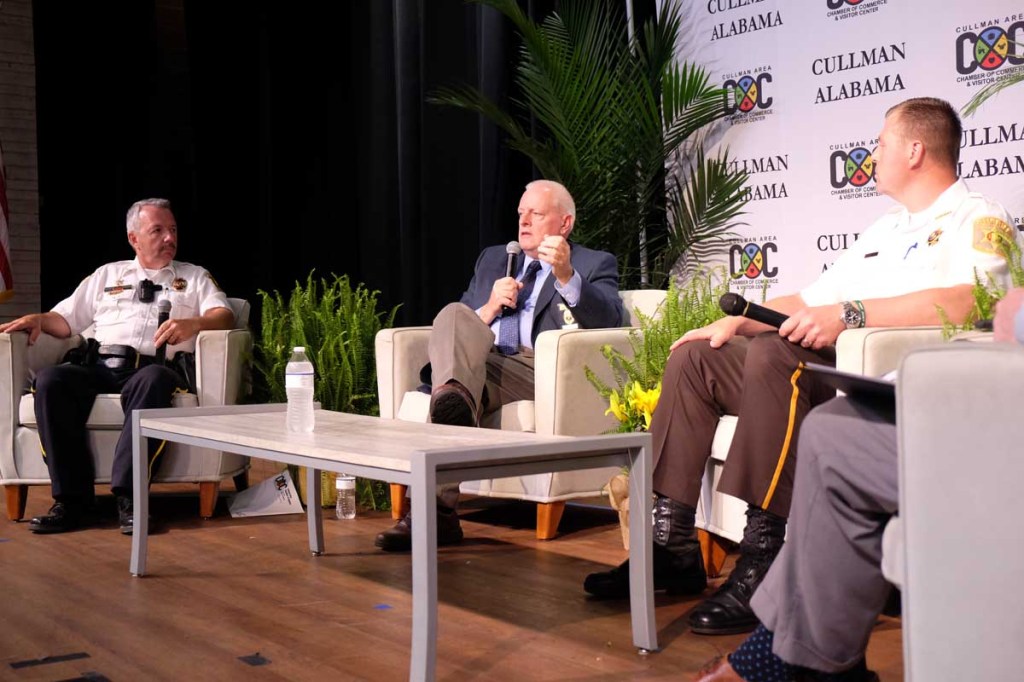State of Our Communities: Traffic concerns top public safety discussion
Published 8:45 pm Friday, April 21, 2017

- Hanceville Chief Bob Long, left, Cullman Chief Kenny Culpepper, center, and Sheriff Matt Gentry discuss public safety.
In a far-ranging panel discussion that touched upon everything from gun laws to social media to prison reform, the topic of traffic in Cullman County may have been the biggest attention-getter.
Trending
Cullman Police Chief Kenny Culpepper, Cullman County Sheriff Matt Gentry and Hanceville Police Chief Bob Long characterized the area’s recent spike in traffic congestion, as well as a marked increase in urban accidents, as products of an enviable phenomenon: Cullman County’s economic growth.
“Let me tell you what the problem is,” said Culpepper. “We’ve got a dynamic Chamber of Commerce that’s promoting Cullman and Cullman County; we’ve got a dynamic economic development agency that’s promoting business and industry, and we’ve got great schools.
“People want to live here. Add all of those things together and we’ve got growth.”
In so many words, Culpepper and his colleagues said growth creates “good” problems, insofar as those problems reflect prosperity and happiness. “But,” admitted Culpepper, “it can be frustrating.”
“When classes at Wallace State are in session, Highway 31 is hopping, but we do a pretty good job of keeping it all flowing,” said Long. “But traffic? Man, that’s a good thing. If you didn’t see anybody out on the road, I think we’d have a more serious problem.”
Gentry deferred to the two municipal police chiefs on the topic of traffic control. But he was quick to give perspective to gun legislation — a topic that took up a significant chunk of the panel’s hour-long run time.
Trending
A 2012 legislative change that made Alabama a “shall issue” state instead of a “may issue” state obviated much of the current emotional debate over this year’s legislative tweaks to gun laws, said Gentry.
“In 2012, we went from a ‘may issue’ state to a ‘shall issue’ state. That took the discretion out of the sheriff’s hands.
“As it stands now, there are three things that can keep you from getting a gun in Alabama today: domestic violence, if you have been deemed mentally incompetent by the courts, or if you are a convicted felon.”
Gentry said he favors “constitutional carry” laws, which aim to limit states’ infringement on the rights endowed by the Second Amendment of the U.S. Constitution. He reasoned that criminals who obtain firearms will always break any gun control law to do so.
“Laws are only abided by by law-abiding citizens,” he said. “Convicted felons don’t care if they have a permit or not. My main focus in Cullman County is that the citizens are safe, and that our law-abiding citizens have the ability to protect themselves.”
Culpepper said a legislative proposal to eliminate concealed carry permits could threaten not only citizen safety, but the safety of law enforcement officers as well.
“I’m personally against it, and the [Alabama Association of Chiefs of Police] was against it,” he said. “I think it makes it more dangerous, and it’s dangerous already. People can open carry anywhere in the state, but it’s just going to make things more dangerous for our officers and citizens.
“Anything we can do to screen people to see whether they have mental issues that can determine whether they shouldn’t have a gun — that’s a good thing.”
Long said he favors required permitting, adding that much of the legislative activity surrounding gun issues seems to stem from political gamesmanship that favors special interests over the general welfare.
Benjamin Bullard can be reached by phone at 256-734-2131 ext. 145.





